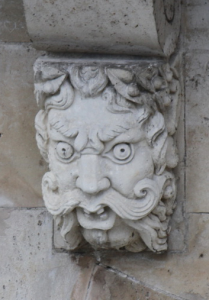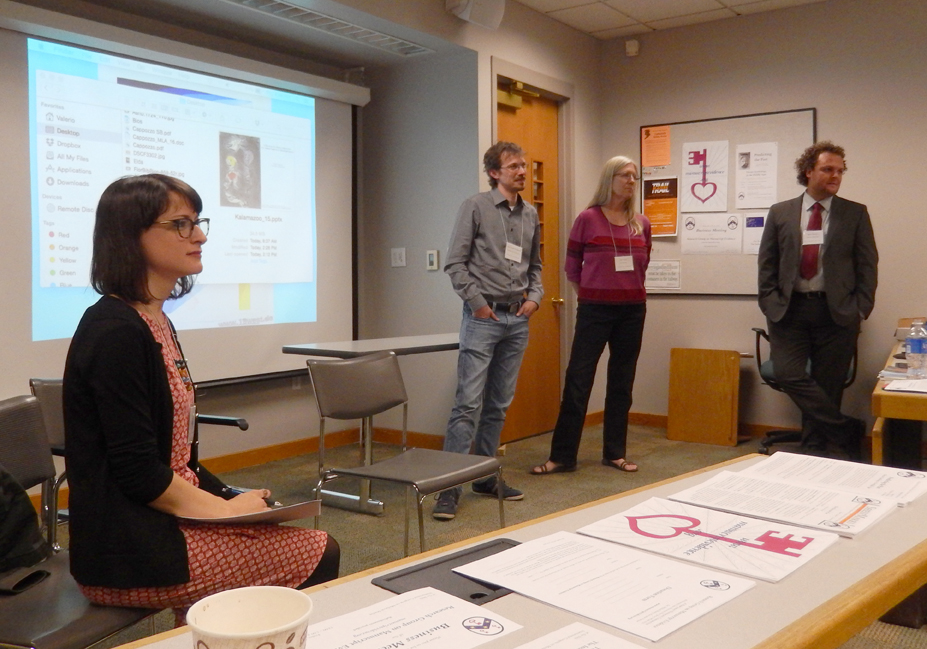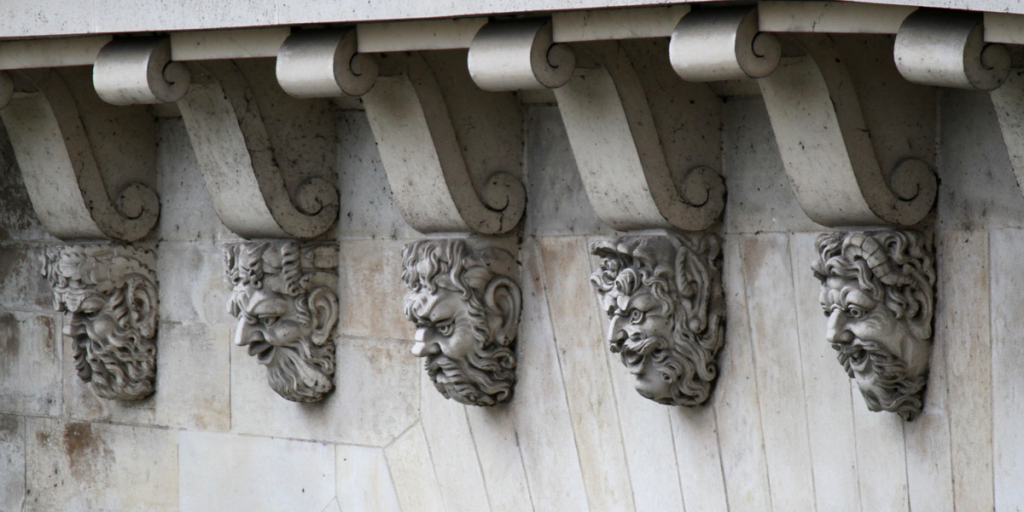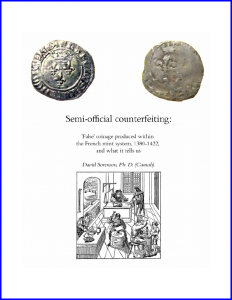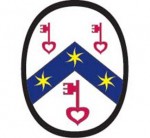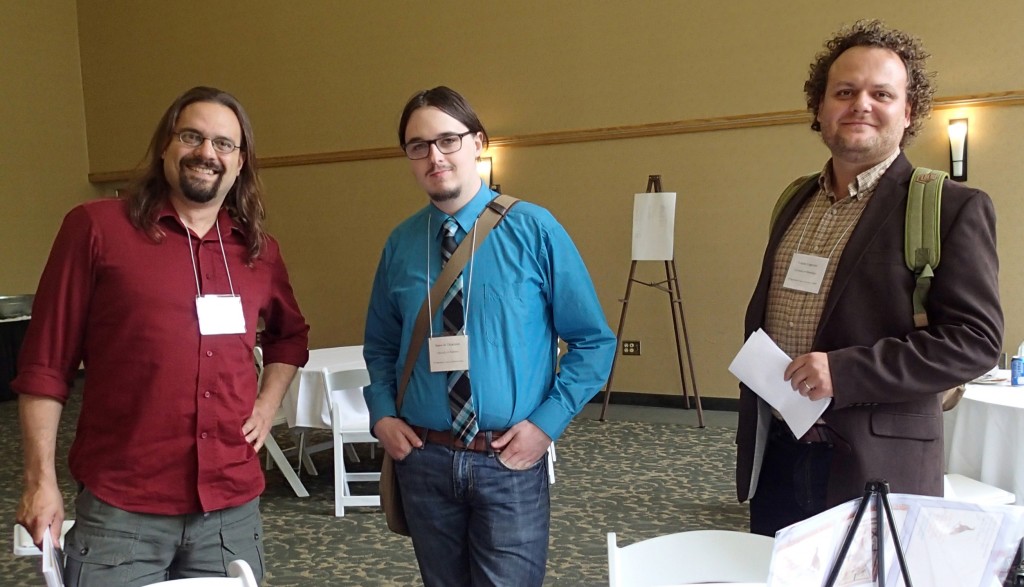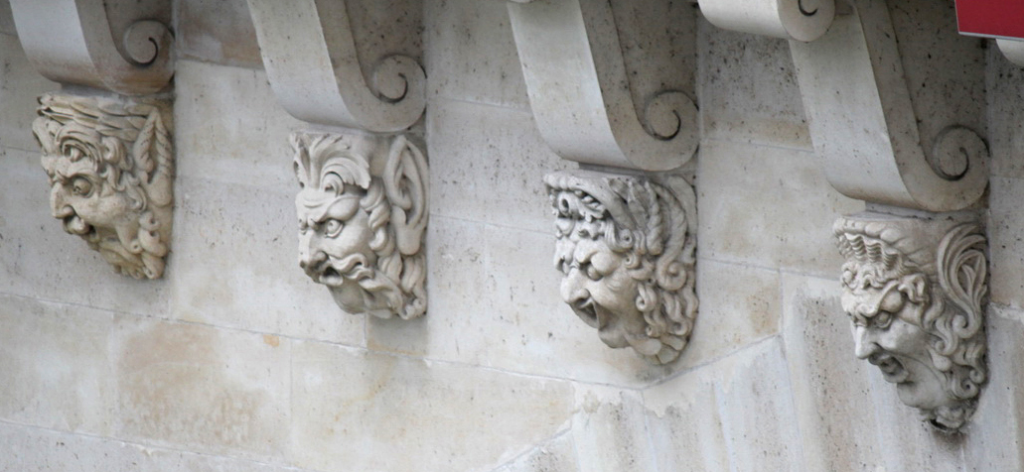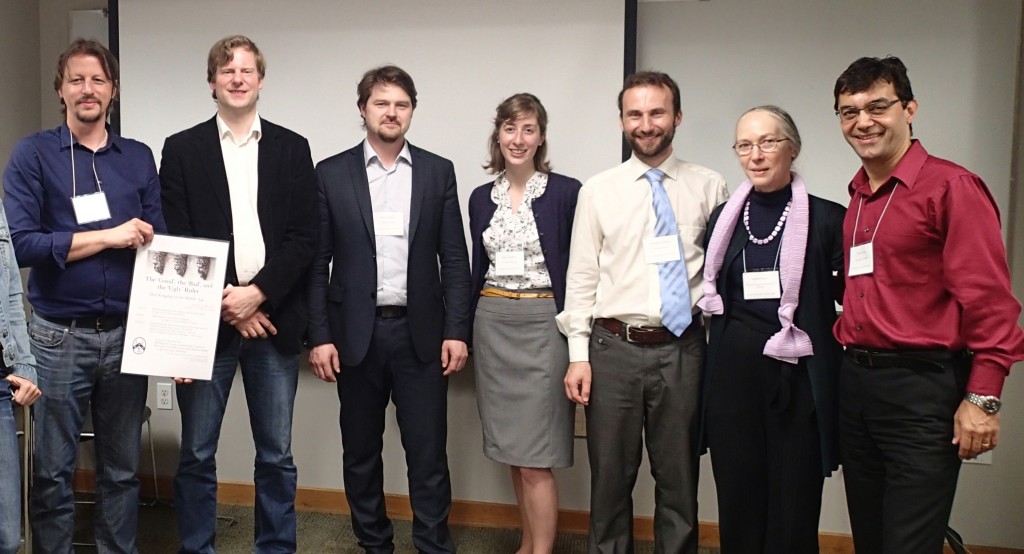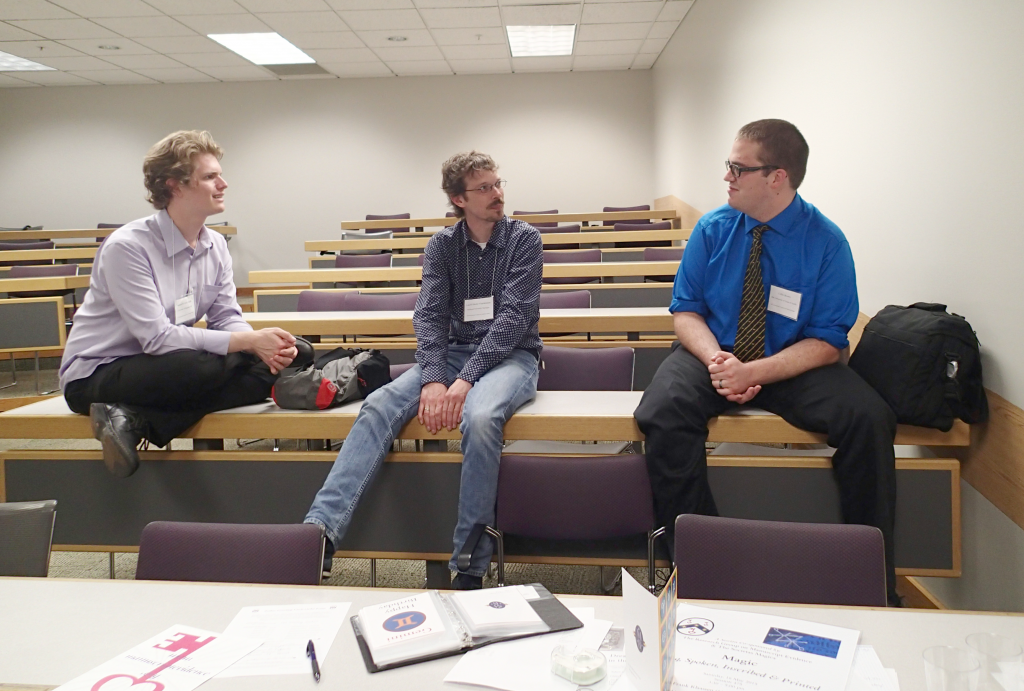2015 Congress Report
May 23, 2015 in Abstracts of Conference Papers, Bembino, Business Meeting, Conference, Conference Announcement, ICMS, International Congress on Medieval Studies, Kalamazoo, Reception
Events Sponsored and Co-Sponsored
by the Research Group on Manuscript Evidence
at the 2015 International Congress on Medieval Studies
14–17 May
[First published with the Announcement of Programs on 6 January 2015, with updates;
revised with Schedule Assignments on 1 February, with updates;
issued with Program Updates plus Abstracts of Papers on 7 April, also with updates;
and now issued here on 23 May 2015 with the 2015 Congress Report]
For the 50th International Congress on Medieval Studies, the Research Group had 2 sponsored and 3 co-sponsored Sessions. They build, in part, upon our 2014 Congress in our Anniversary Year. The aims of the 2015 sessions are described in our 2015 Congress Call for Papers.
As before, we co-sponsored sessions with the Societas Magica (since 2006) and with the Center for Medieval and Early Modern Studies at the University of Florida (since 2014). Like last year, we sponsored a celebratory Reception — now with both the Societas Magica and the Index of Christian Art at Princeton University.
For the first time, our Business Meeting was open to all and listed in the Congress Schedule, which presents the Program as a whole (see below).
Here we announce the events as accomplished, with their Posters. We also post the Abstracts of Papers. A new Feature of our website this year are the
Indexed lists of the Authors of Abstracts for our Congress Sessions
searchable
By Author and
By Year.
The photographs of corbel heads from Le Pont Neuf in Paris are reproduced here by permission, for which we thank Ilya V. Sverdlov.
I. Sponsored Sessions
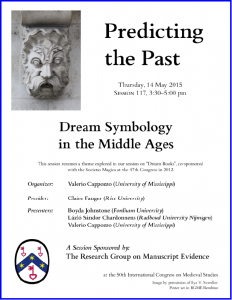 1. Predicting the Past: Dream Symbology in the Middle Ages
1. Predicting the Past: Dream Symbology in the Middle Ages
Organizer: Valerio Cappozzo (Department of Modern Languages, University of Mississippi)
This session resumes a theme explored in the session on ‘Dream Books’, co-sponsored with the Societas Magica, at the 2012 Congress.
Presider: Claire Fanger (Department of Religion, Rice University)
Presenters:
1. Boyda Johnstone (Department of English, Fordham University)
‘Possessed by Dreams: Dream Interpretation Manuals in Late Medieval England’
Abstract of Paper
2. László Sándor Chardonnens (Department of English Language and Culture, Radboud University Nijmegen)
‘Seeing is Believing: Dream Symbols and their Perception in Medieval Alphabetical Dream Books’
Abstract of Paper
3. Valerio Cappozzo
‘A Dictionary for Dream Interpretation: The Somniale Danielis in Its Manuscript Sources’
Abstract of Paper
The Program Booklet for this Session, including a photograph of a Dream Alphabet in vernacular Italian, reproduced with permission of MiBACT, was circulated at the Session. Edited by Mildred Budny and Valerio Cappozzo, and laid out in RGME Bembino, the Booklet is available freely for download here.
*****
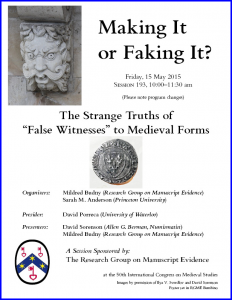 2. Making It or Faking It: The Strange Truths of ‘False Witnesses’ to Medieval Forms
2. Making It or Faking It: The Strange Truths of ‘False Witnesses’ to Medieval Forms
Organizers: Mildred Budny (Research Group on Manuscript Evidence) and Sarah M. Anderson (Princeton University)
Presider: David Porreca (University of Waterloo)
Presenters:
1. David Sorenson (Allen G. Berman, Numismatist)
‘Semi-Official Counterfeiting: “False” Coinage Produced within the French Mints, 1380‒1422, and What It Tells Us’
Abstract of Paper
This illustrated Paper is now published by the Research Group on Manuscript Evidence (2016). You may download it freely here.
2. Mildred Budny (Research Group on Manuscript Evidence)
‘The Truth Will Out: Verity or Verisimilitude in Pre-Photographic Reproductions’
Abstract of Paper
The Session, and the Reception (see below) included a demonstration of some original materials under discussion.
II. Business Meeting of the Research Group on Manuscript Evidence
Friday, 15 May, 12:00 – 1:00 p.m
The 2015 Business Meeting Agenda is available. Its goals were and are to consider our activities for 2014 & 2015, the plans for future activities for 2015, 2016 & beyond (including programs, publications, promotion, and recruiting), and the suggestions emerging from these discussions.
*****
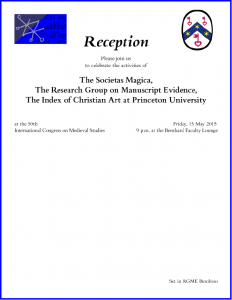 III. Reception
III. Reception
Friday, 15 May, 9:00 – 12:00 p.m.
Co-sponsored by the Societas Magica,
the Research Group on Manuscript Evidence,
and the Index of Christian Art at Princeton University
The success of our Anniversary Reception co-sponsored with the Societas Magica last year led us to plan a similar event this year, now also with the Index of Christian Art, our co-sponsor frequently for events. Those events include several events in our 2014 Anniversary Year: a Symposium in May, a Colloquium in November, and a Seminar in December.
****
IV. Co-Sponsored Sessions
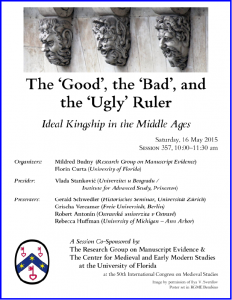 3. The ‘Good’, the ‘Bad’, and the ‘Ugly’ Ruler: Ideal Kingship in the Middle Ages
3. The ‘Good’, the ‘Bad’, and the ‘Ugly’ Ruler: Ideal Kingship in the Middle Ages
Session co-sponsored by the Research Group on Manuscript Evidence and
The Center for Medieval and Early Modern Studies at the University of Florida
Organizers: Mildred Budny (Research Group on Manuscript Evidence) and Florin Curta (Department of History, University of Florida)
Presider: Vlada Stanković (Faculty of Philosophy, Универзитет у Београду / Univerzitet u Beogradu, Serbia, and School of Historical Studies, Institute for Advanced Study, Princeton)
Presenters:
1. Gerald Schwedler (Department of History, Universität Zürich, Switzerland)
‘Speech is Silver, Silence is Golden:
Usurpers’ Deeds and Historians’ Verdicts in Merovingian and Carolingian Chronicles’
Abstract of Paper
2. Grischa Vercamer (Department of History and Cultural Studies, Friedrich-Meinecke-Institut, Freie Universität Berlin, Germany)
‘One Man’s Villain is Another Man’s Hero:
Concepts Employed by Medieval Historians to Construct the Images of Central European Princes as Good or Bad’
Abstract of Paper
3. Robert Antonín (Department of History, Ostravská Univerzita, Czech Republic)
‘Wise as Solomon / Cruel as Rehoboam:
Ancient and Biblical Models for Portraying Good and Bad Rulers in Medieval Central Europe’
Abstract of Paper
4. Rebecca Huffman (Department of English, University of Michigan)
‘In Search of Rule Models in Saint Erkenwald (circa 1386) and Lydgate’s Saints Edmund and Fremund (1433)’
Abstract of Paper
*****
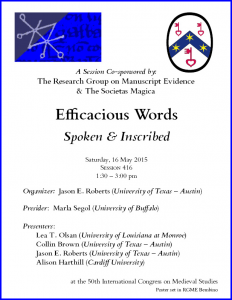 4. Efficacious Words: Spoken and Inscribed
4. Efficacious Words: Spoken and Inscribed
Session co-sponsored by the Societas Magica and
the Research Group on Manuscript Evidence
Session 416 (Schneider 1130): Saturday 1:30–3:00 p.m.
Organizer: Jason E. Roberts (Department of Germanic Studies, University of Texas at Austin)
Presider: Marla Segol (Institute for Jewish Thought and Heritage, State University of New York at Buffalo)
Presenters:
1. Lea T. Olsan (English and Foreign Languages Emerita, University of Louisiana at Monroe)
‘Four Approaches to the Power of Words’
Abstract of Paper
2. Alison Harthill (School of History, Archaeology, and Religion, Cardiff University)
‘Magic, Prayer, and the Power of Words’
Abstract of Paper
3. Collin Brown (Department of Germanic Studies, University of Texas at Austin)
‘Mid uuorrdun endi mid uuercun: The Introduction of Christian Holy Words into Germanic Folk Prayers and Charms’
Abstract of Paper
4. Jason E. Roberts
‘The Power of God’s Name and the Problem of God’s Favor: A Diachronic Examination of the Tradition(s) of Solomonic Magic’
Abstract of Paper
*****
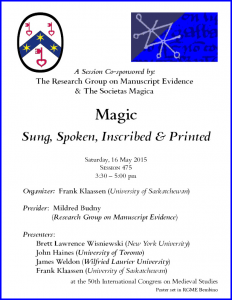 5. Magic Sung, Spoken, Inscribed, and Printed
5. Magic Sung, Spoken, Inscribed, and Printed
Session co-sponsored by the Societas Magica and the Research Group on Manuscript Evidence
Organizer: Frank Klaassen (College of Arts and Sciences, University of Saskatchewan)
Presider: Mildred Budny (Research Group on Manuscript Evidence)
Presenters:
[Brett Lawrence Wisniewski did not attend the Congress to present his paper.]
1>0. Brett Lawrence Wisniewski (Department of Classics, New York University)
‘Voces Magicae in Greek Magical Papyri: Performance, Literacy, and Authority’
Abstract of Paper
2>1. John Haines (Faculty of Music and Centre for Medieval Studies, University of Toronto)
‘Medieval Astrological Songs’
Abstract of Paper
3>2. James Weldon (Department of English and Film Studies, Wilfrid Laurier University)
‘Magical Anxieties: Problems with Magic in Naples, Biblioteca Nazionale, MS XIII.B.29’
Abstract of Paper
4>3. Frank Klaassen
‘How Print Changed Magic: The Case of Reginald Scot’s Discoverie of Witchcraft‘
*****
NOTE: A third Session was Sponsored by the Societas Magica.
Materiality and Magic
Organizer: Marla Segol (State University of New York at Buffalo)
Presider: Frank Klaassen (University of Saskatchewan)
*****
Two more Sessions were sponsored by the Center for Medieval and Early Modern Studies at the University of Florida.
The Archaeology of Early Medieval Europe: New Advances in Avar Archaeology (I and II)
Organizer: Florin Curta (University of Florida)
Presider: Florin Curta
*****
About the Record
Before and during the Congress, its Schedule was available as a printed booklet and in downloadable pdf on the Congress website. The Corrigenda for the Congress were posted online, with updates, up to the time of the Congress, and issued in a printed booklet for participants at the Congress. The links to those elements are now out-of-date, so we remove them from this post, and provide a current link.
Revisions to the printed Schedule, including a room change for our Business Meeting, corrections for some titles of papers, a change of presiders for one of our sessions, the withdrawal of one paper, and updates for other elements in our events are listed both here and, to some extent, in the Congress Corrigenda, which were posted online, with updates, to the time of the Congress, and are now incorporated in the archived “50th International Congress on Medieval Studies” (2015), combining both the printed Program and the final set of Corrigenda.
*****
Future Congress Activities
Information about the Congress as a whole appears here.
We now begin to prepare for the 2016 Congress. For example, the Call For Papers has been issued and completed, with the next steps of preparation progressing in hand. Updates appear in our blog on the International Congress on Medieval Studies.
Information and updates for our events also appear on the Research Group’s Facebook Page. Please visit us there, too.
*****
P.S. Our very own multi-lingual font Bembino, which you see in place on this site, is designed to respect and to reflect our international associations, interests, and contributors.
You can download Bembino for FREE here.
We are preparing an updated version of the font, to include recent requests for astrological and related symbols. A preview of some specimens appears here.
You could sign up for our RGME-Newsletter and information about our activities here. Please stay in touch!
Besides, we plan for the activities at next year’s Congress/.
*****

